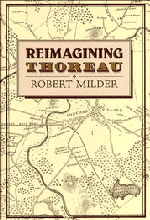8 - “Annexing New Territories” (1857–1862)
Published online by Cambridge University Press: 05 November 2011
Summary
Where are the songs of Spring? Ay, where are they?
Think not of them, thou hast thy music too, –
Keats, “To Autumn”If careers, like novels and plays, assume mythic shape according to their endings, the measure of Thoreau's career as romance, tragedy, divine comedy, or wintry farce depends heavily on one's reading of the achievement and tendencies of his late writings. In addition to “Walking,” revised for publication in 1862 but essentially a work of the early 1850s, Thoreau completed three manuscripts in the last years of his life: “Autumnal Tints,” delivered in Worcester in February 1859 and published five months after his death in the Atlantic Monthly (October 1862); “Wild Apples,” Thoreau's final lecture before the Concord Lyceum, given in February 1860 and also published posthumously in the Atlantic (November 1862); and “The Succession of Forest Trees,” an address to the Middlesex Agricultural Society in September 1860, printed the following month in Horace Greeley's Tribune. A fourth essay, “Huckleberries,” was assembled by Leo Stoller from manuscript leaves. At his death Thoreau also left behind partial drafts of two immense natural history projects, “The Dispersion of Seeds” (a portion of which, edited by Bradley H. Dean, appeared in 1993 as Faith in a Seed) and “Wild Fruits,” along with more than three thousand pages of notes (mostly extracts or paraphrases) on “aboriginal North America: its people, geography, and history,” the literary intention behind which is unclear.
- Type
- Chapter
- Information
- Reimagining Thoreau , pp. 183 - 204Publisher: Cambridge University PressPrint publication year: 1995



